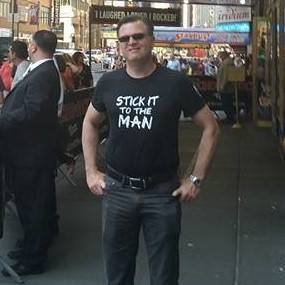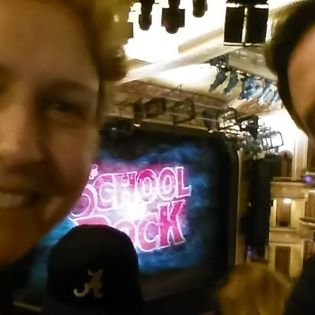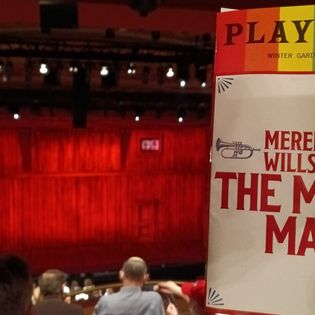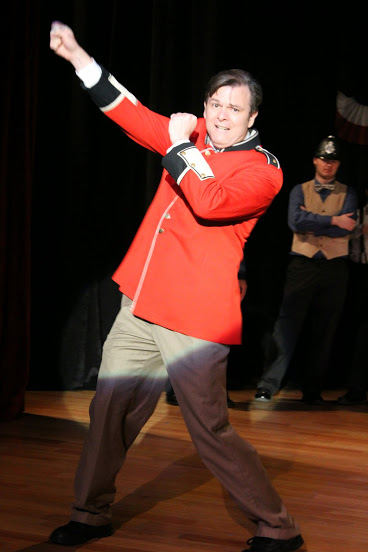Two Musicals About Music… and Education
Posted
In 2016 my wife and I were at the Winter Garden Theater on Broadway to see a musical about a con man who used music to get what he wanted. In 2022 we were at the Winter Garden Theater on Broadway to a musical about a con man who used music to get what he wanted. Was the same musical still playing? No.
In 2016 we went to see School of Rock the Musical, based on School of Rock – my favorite teacher movie.


In 2022 we were at the same theater, this time to see the revival of Meredith Wilson’s The Music Man starring Hugh Jackman. Except we didn’t get Hugh Jackman, who had Covid, but instead got his standby, Max Clayton, who was excellent.

We went with friends who had appeared in the show in college – Kim had played Marian. I played Harold myself just a few years ago in a local production.

I had been saying that the two shows are actually almost the same story. In The Music Man Harold Hill comes to River City, Iowa, to bilk the townspeople out of their money by selling them on the idea of a boy’s band designed to save their town from the invented “trouble” of having a pool table in their community. He actually knows nothing about music, but plans to leave town with the money parents paid for uniforms, instruments, and “lessons” before they get a chance to question why they’ve never heard any music.
In School of Rock, Dewey Finn poses as a substitute teacher (using his roommate’s name) in order to earn some money and not get thrown out of their apartment the way he got thrown out of his rock band. But when he discovers his fifth grade students can play music, he forms the class into a rock band of his own to try to make it into the city’s battle of the bands.
Harold actually transforms the town of River City from a place of stubborn, gloomy citizens, into place of magic, wonder, and music – and in the end stays to become the band leader he always pretended to be. Dewey actually becomes the teacher he pretends to be by tapping into his passion for rock and roll and engaging in project-based-learning. His class doesn’t win the battle of the bands, but he wins by transforming his class into a true artistic community.
In the real world, I don’t know how many con men with hearts of gold transform towns and classrooms into magical, musical places. Probably not very many. But I still love both stories. Why, I wonder?
Maybe because both stories are about an aspect of education that doesn’t get talked about much in all our endless discussion of raising test scores and best practices and PLCs and data: creating magical places.
River City, simply by having the band to look forward to, becomes a different, more vibrant place. The school board members form a barbershop quartet. Winthrop, a boy with a speech impediment, suddenly doesn’t mind speaking and comes out of his shell. The pro-censorship townswomen form an interpretive dance team – and actually read the books they were trying to censor (Chaucer! Rabelais! Balzac!) and decide they like them! (If only our current pro-censorship militants would do the same!)
Dewey Finn’s long-term substitute gig posing as Mr. Schneebly begins with him telling a mindlessly obedient group of students that its recess all day. By the time he’s done with them, the class has become a rock band complete with a student manager, a costume designer, choreographer, and security – in addition to lead and backup singers and instrumentalists. The students have become experts in rock and roll history. The room has been transformed from a dull place of rote learning into a place – again – of magic.
We don’t talk much about magic in education anymore. But the best classrooms have a kind of magic about them – and not just at Hogwarts. It is in the way the room is decorated, the vibe that happens as students enter the room and the teacher greets them, the enthusiasm he or she creates for the learning at hand, the way students feel they have a role to play… Students can tell when a class has magic.
The magic can happen many different ways – as many ways as there are teachers. But I think we are missing something when we don’t look for the magic that happens in classroom. It is how learning becomes lifelong and how lives are transformed.
And it doesn’t take a con man to make it happen. Or does it?
Sometimes when my students come in feeling dull and unenthused – and when I’m not feeling so perky myself, I have to con myself, and them, by mustering energy I don’t really have. I pretend the class is magic. And eventually, somehow, it is.
“I always think there’s a band, kid.”